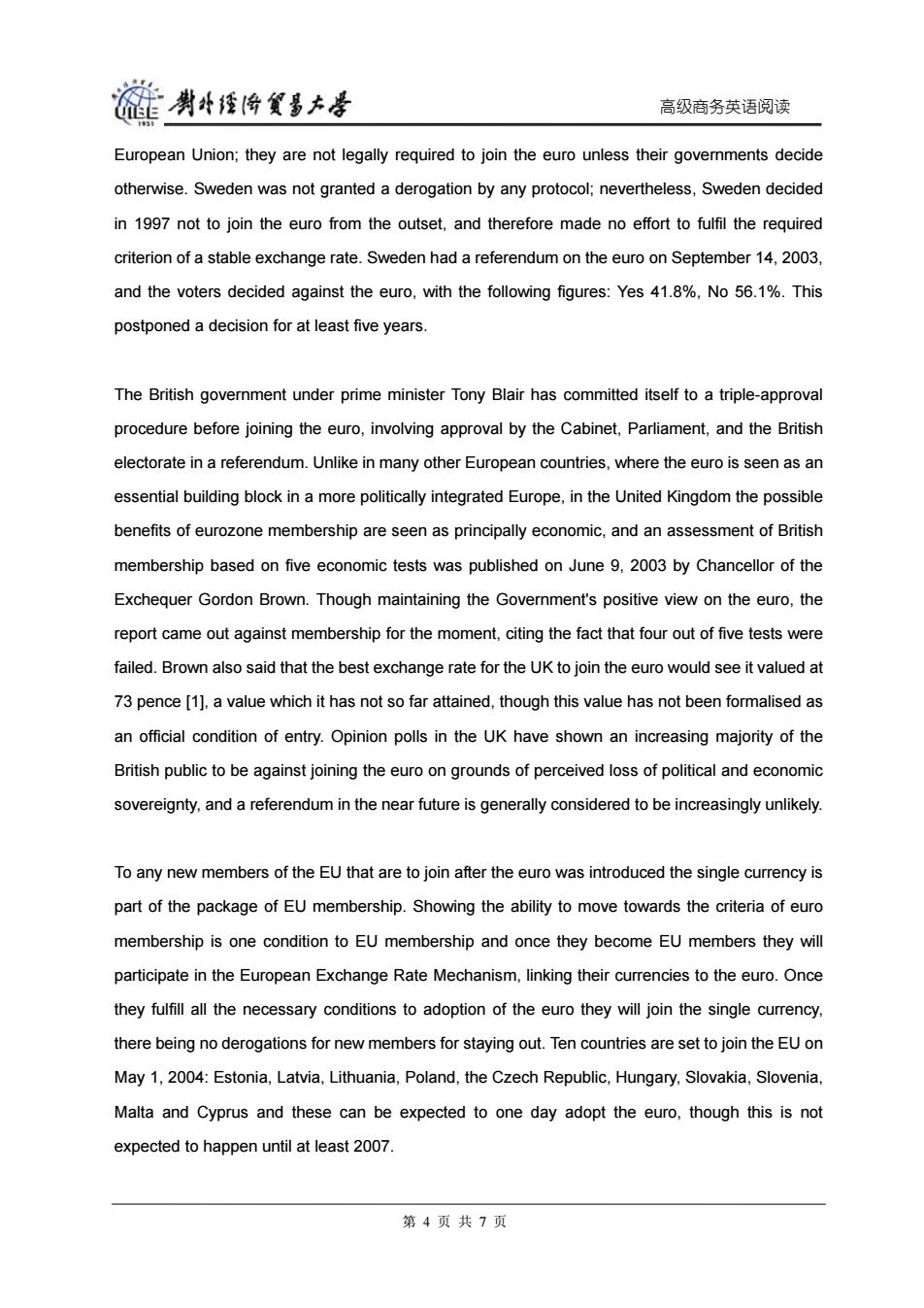正在加载图片...

链潮4将置多大号 高级商务英语阅读 European Union;they are not legally required to join the euro unless their governments decide otherwise.Sweden was not granted a derogation by any protocol;nevertheless,Sweden decided in 1997 not to join the euro from the outset,and therefore made no effort to fulfil the required criterion of a stable exchange rate.Sweden had a referendum on the euro on September 14,2003, and the voters decided against the euro,with the following figures:Yes 41.8%,No 56.1%.This postponed a decision for at least five years. The British government under prime minister Tony Blair has committed itself to a triple-approval procedure before joining the euro,involving approval by the Cabinet,Parliament,and the British electorate in a referendum.Unlike in many other European countries,where the euro is seen as an essential building block in a more politically integrated Europe,in the United Kingdom the possible benefits of eurozone membership are seen as principally economic,and an assessment of British membership based on five economic tests was published on June 9,2003 by Chancellor of the Exchequer Gordon Brown.Though maintaining the Government's positive view on the euro,the report came out against membership for the moment,citing the fact that four out of five tests were failed.Brown also said that the best exchange rate for the UK to join the euro would see it valued at 73 pence [1],a value which it has not so far attained,though this value has not been formalised as an official condition of entry.Opinion polls in the UK have shown an increasing majority of the British public to be against joining the euro on grounds of perceived loss of political and economic sovereignty,and a referendum in the near future is generally considered to be increasingly unlikely. To any new members of the EU that are to join after the euro was introduced the single currency is part of the package of EU membership.Showing the ability to move towards the criteria of euro membership is one condition to EU membership and once they become EU members they will participate in the European Exchange Rate Mechanism,linking their currencies to the euro.Once they fulfill all the necessary conditions to adoption of the euro they will join the single currency. there being no derogations for new members for staying out.Ten countries are set to join the EU on May 1,2004:Estonia,Latvia,Lithuania,Poland,the Czech Republic,Hungary,Slovakia,Slovenia, Malta and Cyprus and these can be expected to one day adopt the euro,though this is not expected to happen until at least 2007. 第4页共7页高级商务英语阅读 European Union; they are not legally required to join the euro unless their governments decide otherwise. Sweden was not granted a derogation by any protocol; nevertheless, Sweden decided in 1997 not to join the euro from the outset, and therefore made no effort to fulfil the required criterion of a stable exchange rate. Sweden had a referendum on the euro on September 14, 2003, and the voters decided against the euro, with the following figures: Yes 41.8%, No 56.1%. This postponed a decision for at least five years. The British government under prime minister Tony Blair has committed itself to a triple-approval procedure before joining the euro, involving approval by the Cabinet, Parliament, and the British electorate in a referendum. Unlike in many other European countries, where the euro is seen as an essential building block in a more politically integrated Europe, in the United Kingdom the possible benefits of eurozone membership are seen as principally economic, and an assessment of British membership based on five economic tests was published on June 9, 2003 by Chancellor of the Exchequer Gordon Brown. Though maintaining the Government's positive view on the euro, the report came out against membership for the moment, citing the fact that four out of five tests were failed. Brown also said that the best exchange rate for the UK to join the euro would see it valued at 73 pence [1], a value which it has not so far attained, though this value has not been formalised as an official condition of entry. Opinion polls in the UK have shown an increasing majority of the British public to be against joining the euro on grounds of perceived loss of political and economic sovereignty, and a referendum in the near future is generally considered to be increasingly unlikely. To any new members of the EU that are to join after the euro was introduced the single currency is part of the package of EU membership. Showing the ability to move towards the criteria of euro membership is one condition to EU membership and once they become EU members they will participate in the European Exchange Rate Mechanism, linking their currencies to the euro. Once they fulfill all the necessary conditions to adoption of the euro they will join the single currency, there being no derogations for new members for staying out. Ten countries are set to join the EU on May 1, 2004: Estonia, Latvia, Lithuania, Poland, the Czech Republic, Hungary, Slovakia, Slovenia, Malta and Cyprus and these can be expected to one day adopt the euro, though this is not expected to happen until at least 2007. 第 4 页 共 7 页